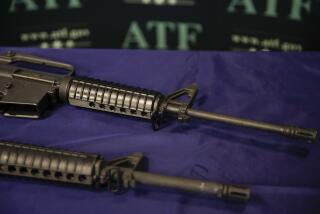Gun Maker Glock Weighs Liabilities Pact
- Share via
WASHINGTON — Faced with mounting political pressure, the nation’s biggest supplier of police firearms said Monday that it is considering entering into a settlement that would free it of legal liabilities in exchange for placing severe restrictions on its manufacturing and marketing operations.
If it agrees to a settlement in the next few days, Glock Inc. would be the first gun maker to follow Smith & Wesson--the nation’s biggest manufacturer of handguns--which entered into a groundbreaking agreement Friday with federal, state and local officials.
Under the terms of that pact, Smith & Wesson pledged to make dozens of concessions aimed at keeping guns out of the hands of children and criminals--including placing mandatory trigger locks on all guns, developing “smart” gun technology to prevent unauthorized use and toughening the code of conduct for gun dealers to deter felons from buying firearms at gun shows. In exchange, the company was released from liability in lawsuits brought by more than 15 cities (including Los Angeles) and other groups seeking to hold manufacturers legally responsible for violence caused by their weapons.
The settlement, brokered by the Clinton administration, drew harsh reaction Monday from the National Rifle Assn., the powerful industry lobby. The NRA, unusually silent when the Smith & Wesson pact was announced, condemned the agreement in a statement as a “futile act of self-interest” by the Massachusetts gun maker.
“Smith & Wesson has promised away not only its own rights but those of licensed gun dealers and law-abiding gun owners,” NRA chief lobbyist James Jay Baker said Monday. The group urged gun owners to oppose the plan.
But the industry split caused by Smith & Wesson’s move threatens to grow even wider if Glock agrees to similar terms.
“We’re carefully reviewing the proposal that Smith & Wesson agreed to, and we’re trying to see what our position needs to be,” Jim Pledger, national sales manager for Georgia-based Glock, said in an interview. “What we need to do is make a good business decision and a good decision related to public policy.”
Glock is under particular pressure in the industry because federal and local officials in Washington, Los Angeles, New York and elsewhere say they may try to organize government boycotts of gun suppliers who do not abide by the restrictions established by Smith & Wesson.
Glock has built its reputation as a leading supplier of police firearms. The company has contracts authorizing it to supply firearms to about 60% of the nation’s 15,000 law-enforcement agencies, plus military weaponry, Pledger said.
Pledger said Glock wants to talk with government officials about “some real concerns” regarding elements of the Smith & Wesson agreement.
He would not spell out those concerns. But he noted that in a straw poll of about 100 callers to the company Monday--nearly all of whom opposed the Smith & Wesson deal--gun owners voiced concerns about how the government would impose “smart” gun technology and mandatory safety training for firearm purchasers, he said.
Glock officials want to “take a real close look” at some 80 provisions to which Smith & Wesson agreed, Pledger said. “We’re trying to be open to this. . . . My hope is we can find something in the middle.”
Pledger said he expects a decision by the end of this week. “We may be very, very close. We just need some more time,” he said.
More to Read
Inside the business of entertainment
The Wide Shot brings you news, analysis and insights on everything from streaming wars to production — and what it all means for the future.
You may occasionally receive promotional content from the Los Angeles Times.








